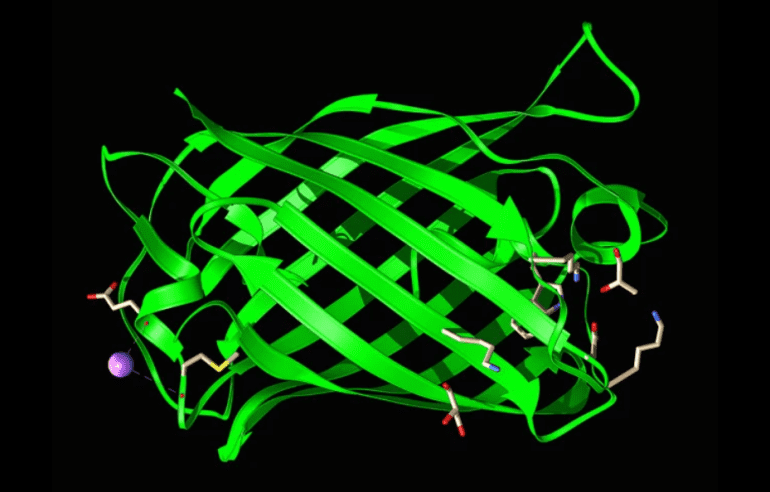- EvolutionaryScale, founded by ex-Meta scientists, introduces ESM3, a cutting-edge AI model for protein engineering.
- ESM3 is trained on 2.7 billion protein sequences and structures, enabling precise design tailored to user specifications.
- Initial demonstrations include redesigning the green fluorescent protein (GFP), yielding novel variants with promising fluorescence properties.
- Despite challenges, iterative improvements have led to proteins comparable in brightness to lab-engineered variants.
- ESM3 represents a milestone in biological AI, exceeding computational thresholds requiring regulatory engagement.
- Applications extend to drug development, sustainability, and beyond, with potential implications for diverse industries.
Main AI News:
In a landmark development bridging artificial intelligence (AI) with biological innovation, EvolutionaryScale, a venture founded by former Meta scientists in New York City, has unveiled ESM3—a monumental AI model poised to redefine protein engineering. Backed by a substantial $142 million in new funding, the company aims to leverage ESM3 across diverse domains, from drug development to sustainability initiatives, marking a significant stride in the convergence of AI and biology.
ESM3, a sophisticated protein language model, represents a quantum leap in computational biology. Trained on an extensive dataset encompassing over 2.7 billion protein sequences, structures, and functional annotations, it empowers researchers to design custom proteins with precision, akin to how chatbots generate text responses. Chief Scientist Alex Rives, formerly instrumental in Meta’s pioneering AI applications in biological data, underscores ESM3’s potential to make biology programmable—an ambition underscored by its ability to generate protein designs tailored to specific criteria.
The proof-of-principle for ESM3’s capabilities was demonstrated through the redesign of the green fluorescent protein (GFP), an iconic tool in molecular biology. Originally isolated from the bioluminescent jellyfish Aequorea victoria, GFP revolutionized biological imaging and earned a Nobel Prize for its discoverers. Rives and his team tasked ESM3 with creating GFP-like proteins featuring modified amino acid sequences optimized for fluorescence. Initial iterations yielded promising but dim results, prompting iterative improvements that ultimately produced proteins rivaling the brightness of laboratory-engineered variants.
This milestone showcases ESM3’s capacity to innovate protein design beyond conventional approaches. Despite initial setbacks, including proteins vastly dimmer than natural GFP variants, ESM3’s iterative design process yielded novel fluorescent proteins, such as esmGFP, structurally reminiscent of natural counterparts yet divergent in amino acid sequence. This departure, matching less than 60% of the sequence of the closest known fluorescent protein, underscores ESM3’s potential to explore evolutionary pathways in protein design.
Amid accolades for its innovation, ESM3 also prompts discussions on responsible AI deployment and regulatory oversight. As one of the first biological AI models to exceed computational thresholds necessitating government notification, EvolutionaryScale has engaged proactively with regulatory bodies like the US Office of Science and Technology Policy to ensure robust risk mitigation measures are in place.
Looking ahead, EvolutionaryScale envisions broad applications for ESM3—from sustainability initiatives, exemplified by the design of plastic-eating enzymes, to the development of antibodies and other protein-based therapeutics. Martin Pacesa, a structural biologist at the Swiss Federal Institute of Technology in Lausanne, lauds ESM3 for its groundbreaking features, including natural-language specifications of protein designs—an innovation poised to democratize access to advanced biological modeling tools.
As EvolutionaryScale charts the next frontier in biological AI with ESM3, the model stands as a testament to the transformative potential of AI in unlocking new frontiers in biotechnology. With ambitions extending beyond protein engineering into diverse applications, ESM3 heralds a new era where AI-driven innovation intersects with biological discovery, promising unprecedented advancements in medicine, sustainability, and beyond.
Conclusion:
EvolutionaryScale’s launch of ESM3 marks a significant advancement in the integration of artificial intelligence with biotechnology. By enabling precise and innovative protein design capabilities, ESM3 not only pushes the boundaries of biological research but also opens new avenues in drug development and sustainability. Its introduction underscores a pivotal shift towards AI-driven solutions in the market, promising transformative impacts across various industries.

